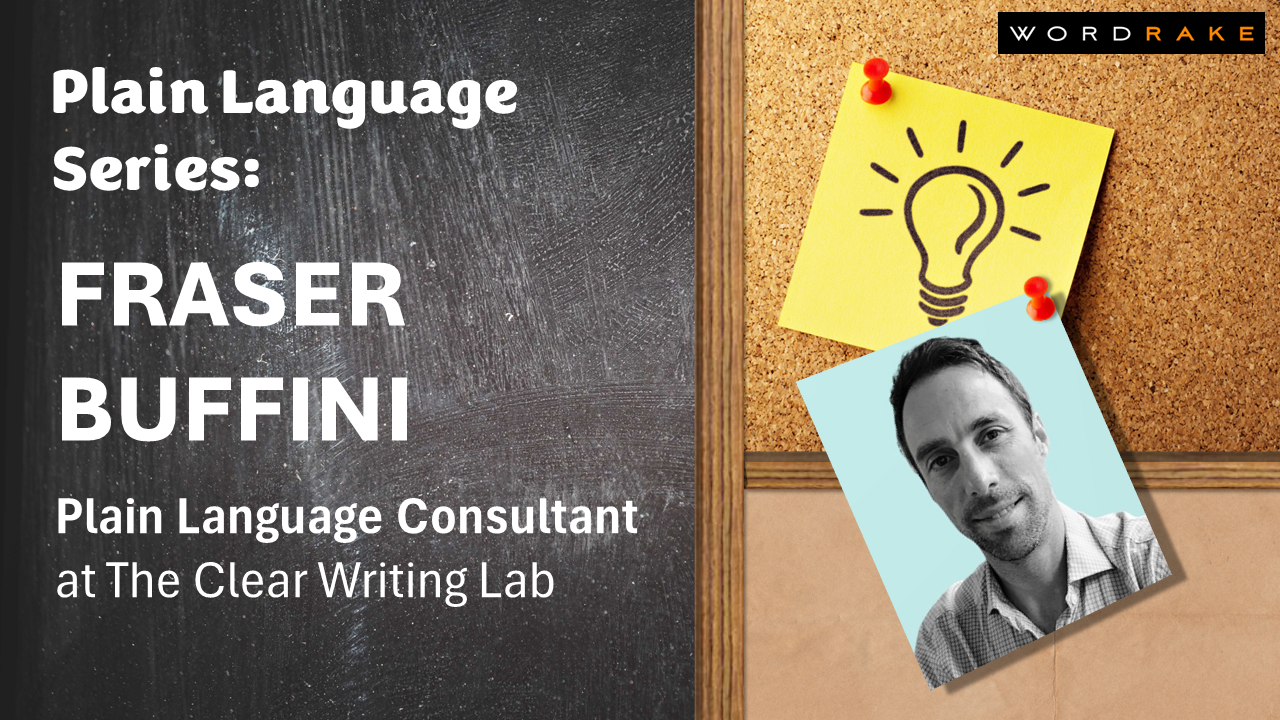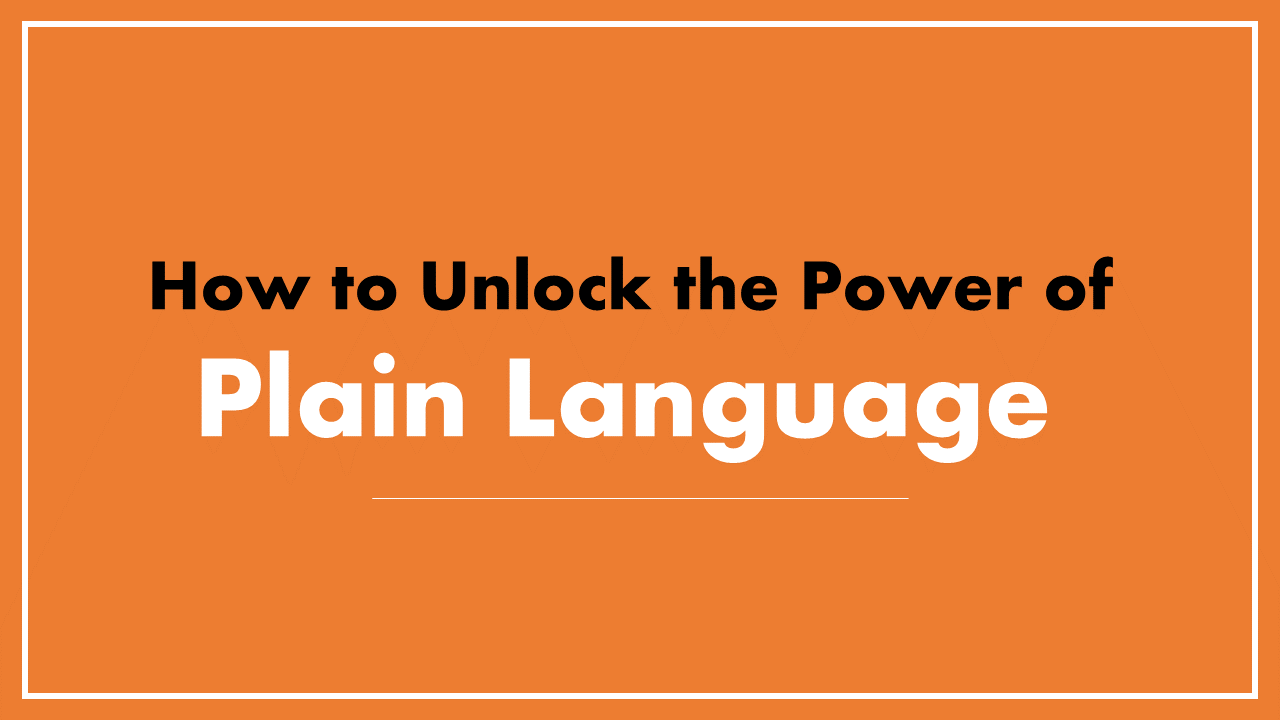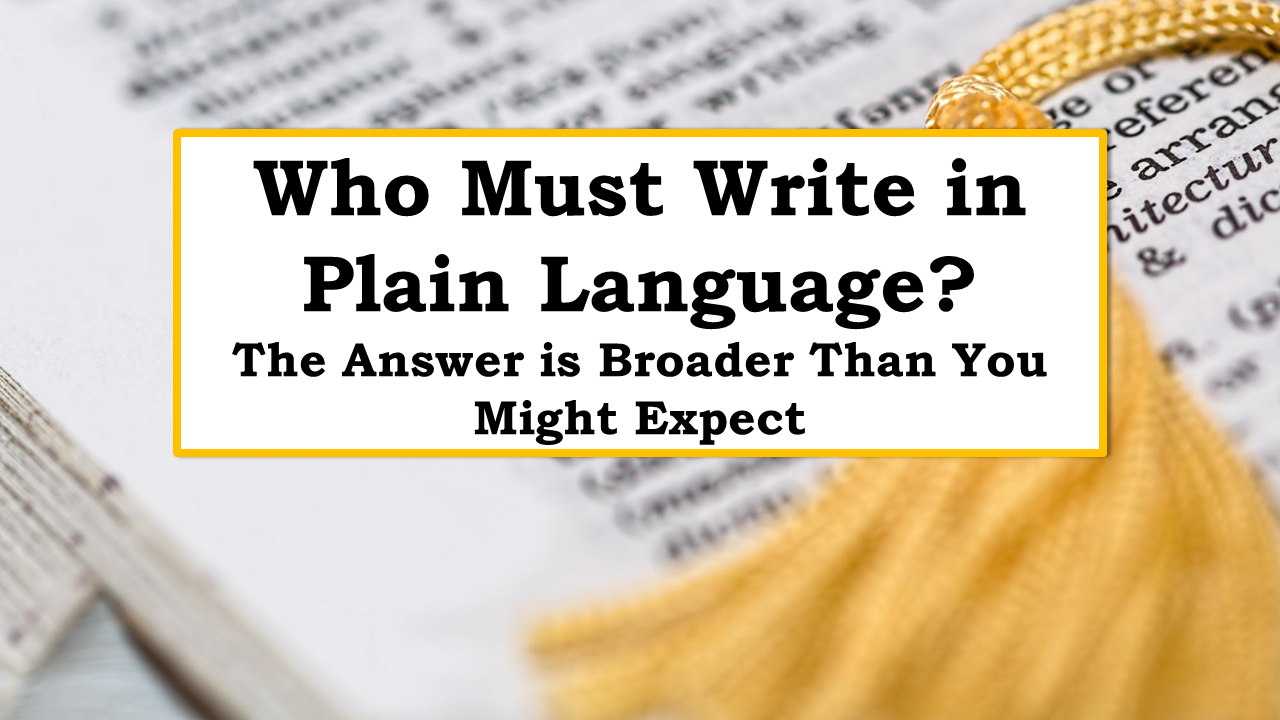Everyone needs access to certain information from their governments and service providers. Those tasked with creating those documents have a responsibility to use language that their citizens and customers can understand. Plain language consultant Fraser Buffini points out the importance of clear communication: if you don't know what a set of instructions mean, you're not going to follow them. He shares his strategies for making sure folks can access their rights and fulfill their responsibilities in the interview below.
What is your role and how is it connected to plain language?
I run The Clear Writing Lab, my little online consultancy where I work on commercial plain language projects. I mainly work with international organizations like the EU and the UN, but enjoy working on legal projects too. I also spend a lot of my time as a Plain Language Consultant for Write Ltd. They have done so much to advocate for the plain language movement – and they essentially pioneered plain language as a commercial product. It’s such a joy to work with them. I get to work with a large team of plain language experts on a big mix of projects, and they all have seriously deep knowledge. Because plain language is such a new and evolving industry, it’s hard to find someone experienced to bounce ideas off and to talk with about what works and what doesn’t. Being able to have that sort of exchange at places like Write is crucial for the collective health of the industry.
What prompted your interest in plain language?
Orwell. Without any doubt. In my former life, I worked in the EU, mainly on rule-of-law building in post-conflict countries, which can be very political. When I was in my first job, a smart mentor once told me to read Orwell’s essay ‘Politics and the English Language’ every six months. I still do to this day. What hits me about that essay is Orwell’s search for the truth through brutal, uncomfortable honesty – about your own writing as much as about someone else’s. You see this vicious honesty in all his other essays and non-fiction books.
The way I see it is this: when ideas are easy to understand, more people will be able to think about them. And when more people can think about ideas, more people will help correct and develop them. This process of publicly checking each other’s work has advanced human knowledge at an unprecedented rate over the last few hundred years. Plain language can make that process advance even more quickly.
What is the difference between plain language and plain English?
Plain language is the natural evolution of plain English. While plain English is about making texts easier to understand, plain language is about making texts easier to read. That’s crucial in the digital age since attention spans have been completely overwhelmed. Most people have some understanding of plain English: cut out the jargon, avoid the passive voice — these sorts of things. But making a text easier to read means thinking about how the reader can consume your text quickly and easily. Will they be able to scan this text and find information quickly? What headings will help them do that? Can I break these paragraphs into different sections? Is there some graphic we can use to help them understand the information better?
What are some factors that indicate a need to write in plain language?
Our eyes and ears have been flooded with limitless information since everyone started using the internet – especially since social media took off. The traditional gatekeepers of information have been brushed aside by this information revolution, much like what happened when the printing press was developed. Everyone is scrambling for power and control of that information. This makes it even more important that our lawmakers, scientists, and business leaders learn how to adapt so that their valuable information remains a public good. That crucial information is now competing with a deluge of useless information – plain language is an effective way to hold people’s focus on difficult, but important, topics.
How does plain language impact access to justice?
Part of my last job was making sure the court system in a multi-ethnic, multilingual country was running smoothly, and fairly. The majority ethnicity often failed (sometimes intentionally, sometimes because they didn’t have the resources) to provide basic rule-of-law services to citizens that spoke a minority language. If you can’t understand a ruling, a summons, or a basic police report, you essentially have zero access to justice. You could put this situation on the extreme end of the access-to-justice spectrum. Citizens who at least speak the same language, but struggle to understand the terminology and jargon probably fall in the middle of that spectrum. Plain language can help move people closer to fully understanding, bringing them to an even better place on that access-to-justice spectrum.
Many professions (i.e., law, medicine, finance) are gatekeepers of important information for the public. What obligations do professionals have to communicate in plain language?
Annetta Cheek famously said “Government is all about telling people what to do. If you don’t write clearly, they’re not going to do it.” While government is all about telling people what to do, businesses are all about convincing people what to do. If you don’t write clearly, they won’t be convinced. You could so easily repackage this quote to law, medicine, and finance, too.
What’s the most important—yet simple—change professionals can make to consumer-facing documents to improve understanding?
Coming from more of a political background, it’s trying to use the active voice when you can. I used to think politicians and diplomats were always trying to hide things or protect their egos by using the passive voice. Actually, they were just being lazy most of the time. People hated it when I highlighted the passive in their texts, because it forced them to find out who did the thing. That meant extra work. But it often opened the door to new and interesting things we never knew about. I’d also say that using ‘we’ and ‘you’ instead of things like ‘the company’ and ‘the client’ will make documents so much easier to read.
Where will consumers commonly encounter the most confusing language?
Contracts and agreements. Or anywhere lawyers are involved who see the public as secondary. Cervantes once hilariously wrote “But do not give it to a lawyer’s clerk to write, for they use a legal hand that Satan himself will not understand.” While the legal profession has historically been the biggest criminal when it comes to bad writing, it is actually the profession where some of the best plain language work has been done. People like Joe Kimble have been doing so much diligent work to build the case for plain language by collecting robust evidence, rather than simply appealing to common sense.
What’s one piece of advice that you would offer to help a professional start using plain language?
Think about the reader. It’s more of a skill you have to learn over time than a tip you can quickly start using. Steven Pinker talks about the curse of knowledge in his wonderful book The Sense of Style. The curse of knowledge is where you find it really hard to put yourself in the position of someone who doesn’t know about the thing you know. It leads to all sorts of messy writing. Understanding how to overcome this is a good place to start (the trick is to treat your reader as smart, but just unfamiliar with the topic). Thinking about the reader can also lead you towards information design, things like graphics, layout, and white space. This does wonders in making texts easier to scan. Since readers in this new information age tend to scan text rather than diligently read it, you want to make that as easy to do as possible.
It’s hard for lots of people to put their egos aside and understand that the average reader is not going to enthusiastically hang on every word of your text. I once asked a legal adviser to write a one-pager of a complex case that would be sent to Europe’s top diplomat. He sent me ten pages. When I told him the top diplomat wouldn’t have time to read that, he told me with a straight face “well it’s their job to read it all”. We need to wash this thinking out of us as soon as we leave school or university. In the real world, people are no longer paid to read every single word of your text. If we can get the universities to send students out into the job market with more suitable writing skills, we could save everyone so much time, effort and money.
About Fraser Buffini
Fraser started his career working for the security blob in international relations and security-related things. He started off making political waffle sound snappy enough to catch the attention of decision makers in the EU, before heading to the Balkans. There he did all sorts of interesting stuff building the rule of law, but he mainly wrote speeches, edited documents, and drafted reports. Throughout his whole career he has been an advocate for plain language. After leaving that world behind, Fraser set up his own clear writing consultancy, The Clear Writing Lab. He also does lots of contracting work for Write Ltd, where he gets to work on projects with some of the world’s best plain language professionals. You can find him on LinkedIn.
About WordRake and International Plain Language Day
Plain Language experts Cheryl Stephens and Kate Harrison Whiteside created International Plain Language Day on October 13, 2011 to celebrate the first anniversary of the signing of the Plain Language Act in the United States. Since then, plain language enthusiasts take time each year to celebrate the gains the movement has made.
In October 2022, WordRake celebrated Plain Language Day by releasing their new Simplicity editing mode to help comply with plain language laws. As firm believers in the importance of clear communication, WordRake celebrates October 13th by highlighting experts and leaders in the plain language field. To see how WordRake can help you simplify your writing, take a 7-day free trial today!









